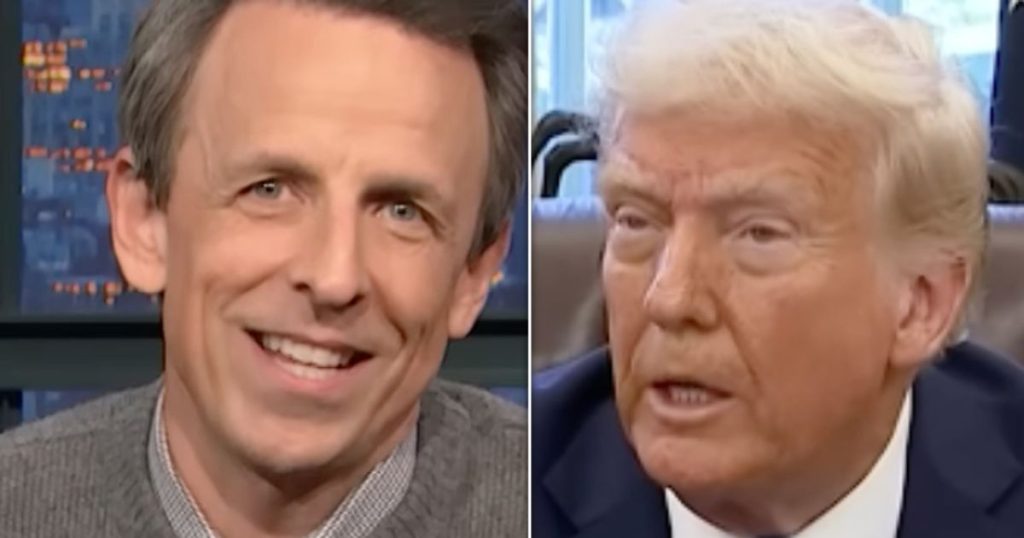Seth Meyers, the host of Late Night with Seth Meyers, delivered a hilarious and biting monologue on Thursday, poking fun at former President Donald Trump’s peculiar way of speaking. Meyers specifically focused on Trump’s recent glowing review of Elon Musk’s bid to slash government spending. Trump, known for his boastful and often vague rhetoric, praised Musk for doing “a great job” and even referenced a mysterious “whole thing with, uh, 100 million spent on you-know-what.” Meyers, however, wasn’t having it. He mocked Trump’s tendency to leave out critical details, comparing it to playing a real-time version of Mad Libs, the popular word game where players fill in the blanks of a story with random words to create humorous results. Meyers’ joke struck a chord, as it perfectly captured the absurdity of Trump’s communication style, which often leaves listeners confused and scrambling to fill in the gaps.
Meyers began his monologue by highlighting the absurdity of Trump’s praise for Musk. He pointed out how Trump, in his typical fashion, bragged about Musk’s accomplishments but failed to provide any specific details. At one point, Trump said, “the whole thing with, uh, 100 million spent on you-know-what.” Meyers sarcastically responded, “No, I don’t know what. Do you?” He then questioned why the former president’s sentences often feel like riddles, forcing listeners to guess what he’s talking about. Meyers likened this experience to a familiar scenario many people can relate to: when someone cryptically reacts to something, leaving others befuddled. For example, he joked about his wife looking out the window, exclaiming, “Oh, my God!” only to refuse to elaborate. “And I’m like, ‘What’s going on?’ And she’s like, ‘This is unreal!’” Meyers continued, “And then I finally have to get up and go look, and it’s just like, you know, the mailman’s wearing shorts.” This relatable analogy perfectly encapsulated the frustration of trying to decipher Trump’s vague statements.
The Late Night host further emphasized how Trump’s speaking style has become a recurring theme in American politics. He compared it to a real-time game of Mad Libs, where the audience is left to fill in the blanks of Trump’s incomplete sentences. Meyers even aired a satirical clip of Trump attempting to play the game, further highlighting the absurdity of the situation. By doing so, Meyers not only entertained his audience but also shed light on the broader issue of Trump’s communication style, which often prioritizes bravado over clarity. This tendency to speak in generalities has long been a hallmark of Trump’s rhetoric, and Meyers cleverly used humor to critique it.
Meyers’ monologue also served as a commentary on the larger implications of Trump’s vague language. While it may seem harmless or even amusing, the lack of specificity in Trump’s speech can have serious consequences. For instance, when discussing important issues like government spending or policy decisions, clarity is essential. Trump’s failure to provide details can undermine transparency and accountability, leaving the public and even his supporters in the dark. Meyers’ jokes, therefore, were not just about entertainment; they were also a subtle critique of the need for clear and honest communication in leadership. By framing Trump’s behavior as a game of Mad Libs, Meyers made the critique more accessible and relatable to his audience.
The monologue also highlighted the unique role that late-night comedians like Meyers play in the political discourse. By using humor to call out the absurdities of politics, they provide a much-needed outlet for frustration and confusion. Meyers’ ability to laugh at the situation while also pointing out its significance is a testament to the power of comedy as a form of social commentary. In a time when political rhetoric often feels divisive and exhausting, comedians like Meyers offer a refreshing perspective that resonates with a wide audience. His jokes not only entertain but also encourage critical thinking about the state of politics and communication in America.
In conclusion, Seth Meyers’ monologue on Thursday was a masterclass in using humor to critique the absurdities of political rhetoric. By comparing Trump’s vague statements to a game of Mad Libs, Meyers highlighted the former president’s tendency to leave out important details, leaving listeners to fill in the blanks. The monologue was both entertaining and thought-provoking, offering a relatable take on the challenges of deciphering Trump’s rhetoric. Meyers’ ability to blend humor with social commentary reminds us of the importance of clear communication in leadership and the role that comedy can play in holding public figures accountable. Whether you agree with Meyers’ political views or not, his monologue served as a reminder of the power of humor to make sense of the chaos that often defines modern politics.
